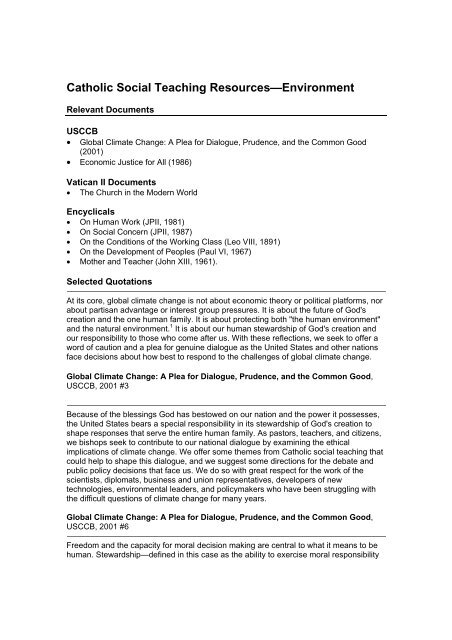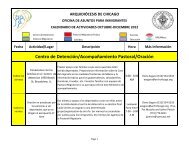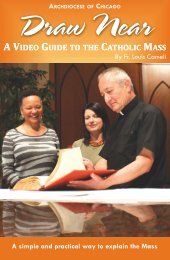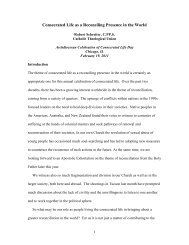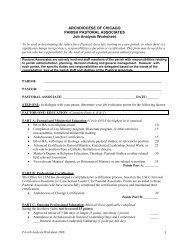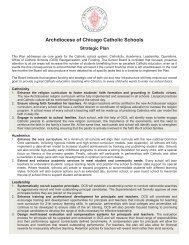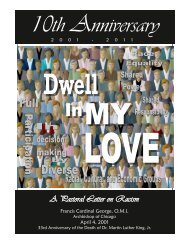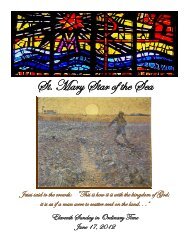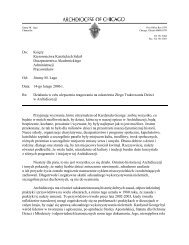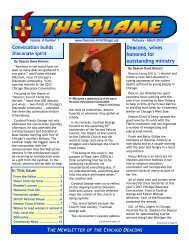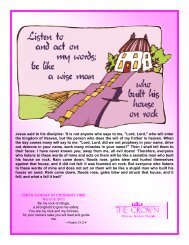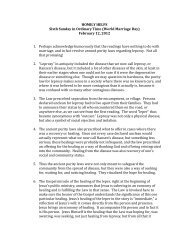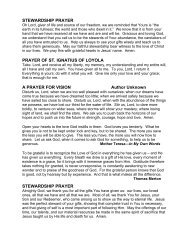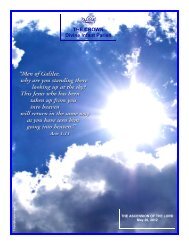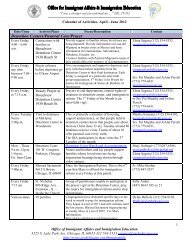Catholic Social Teaching Resources—Environment
Catholic Social Teaching Resources—Environment
Catholic Social Teaching Resources—Environment
You also want an ePaper? Increase the reach of your titles
YUMPU automatically turns print PDFs into web optimized ePapers that Google loves.
<strong>Catholic</strong> <strong>Social</strong> <strong>Teaching</strong> <strong>Resources—Environment</strong><br />
Relevant Documents<br />
USCCB<br />
• Global Climate Change: A Plea for Dialogue, Prudence, and the Common Good<br />
(2001)<br />
• Economic Justice for All (1986)<br />
Vatican II Documents<br />
• The Church in the Modern World<br />
Encyclicals<br />
• On Human Work (JPII, 1981)<br />
• On <strong>Social</strong> Concern (JPII, 1987)<br />
• On the Conditions of the Working Class (Leo VIII, 1891)<br />
• On the Development of Peoples (Paul VI, 1967)<br />
• Mother and Teacher (John XIII, 1961).<br />
Selected Quotations<br />
At its core, global climate change is not about economic theory or political platforms, nor<br />
about partisan advantage or interest group pressures. It is about the future of God's<br />
creation and the one human family. It is about protecting both "the human environment"<br />
and the natural environment. 1 It is about our human stewardship of God's creation and<br />
our responsibility to those who come after us. With these reflections, we seek to offer a<br />
word of caution and a plea for genuine dialogue as the United States and other nations<br />
face decisions about how best to respond to the challenges of global climate change.<br />
Global Climate Change: A Plea for Dialogue, Prudence, and the Common Good,<br />
USCCB, 2001 #3<br />
Because of the blessings God has bestowed on our nation and the power it possesses,<br />
the United States bears a special responsibility in its stewardship of God's creation to<br />
shape responses that serve the entire human family. As pastors, teachers, and citizens,<br />
we bishops seek to contribute to our national dialogue by examining the ethical<br />
implications of climate change. We offer some themes from <strong>Catholic</strong> social teaching that<br />
could help to shape this dialogue, and we suggest some directions for the debate and<br />
public policy decisions that face us. We do so with great respect for the work of the<br />
scientists, diplomats, business and union representatives, developers of new<br />
technologies, environmental leaders, and policymakers who have been struggling with<br />
the difficult questions of climate change for many years.<br />
Global Climate Change: A Plea for Dialogue, Prudence, and the Common Good,<br />
USCCB, 2001 #6<br />
Freedom and the capacity for moral decision making are central to what it means to be<br />
human. Stewardship—defined in this case as the ability to exercise moral responsibility
to care for the environment—requires freedom to act. Significant aspects of this<br />
stewardship include the right to private initiative, the ownership of property, and the<br />
exercise of responsible freedom in the economic sector. Stewardship requires a careful<br />
protection of the environment and calls us to use our intelligence "to discover the earth's<br />
productive potential and the many different ways in which human needs can be<br />
satisfied." 4<br />
Global Climate Change: A Plea for Dialogue, Prudence, and the Common Good,<br />
USCCB, 2001 #16<br />
True stewardship requires changes in human actions—both in moral behavior and<br />
technical advancement. Our religious tradition has always urged restraint and<br />
moderation in the use of material goods, so we must not allow our desire to possess<br />
more material things to overtake our concern for the basic needs of people and the<br />
environment. Pope John Paul II has linked protecting the environment to "authentic<br />
human ecology," which can overcome "structures of sin" and which promotes both<br />
human dignity and respect for creation.6 Technological innovation and entrepreneurship<br />
can help make possible options that can lead us to a more environmentally benign<br />
energy path. Changes in lifestyle based on traditional moral virtues can ease the way to<br />
a sustainable and equitable world economy in which sacrifice will no longer be an<br />
unpopular concept. For many of us, a life less focused on material gain may remind us<br />
that we are more than what we have. Rejecting the false promises of excessive or<br />
conspicuous consumption can even allow more time for family, friends, and civic<br />
responsibilities. A renewed sense of sacrifice and restraint could make an essential<br />
contribution to addressing global climate change<br />
Global Climate Change: A Plea for Dialogue, Prudence, and the Common<br />
Good, USCCB, 2001 #18<br />
As <strong>Catholic</strong> bishops, we seek to offer a distinctively religious and moral perspective to<br />
what is necessarily a complicated scientific, economic, and political discussion. Ethical<br />
questions lie at the heart of the challenges facing us. John Paul II insists, "We face a<br />
fundamental question which can be described as both ethical and ecological. How can<br />
accelerated development be prevented from turning against man? How can one prevent<br />
disasters that destroy the environment and threaten all forms of life, and how can the<br />
negative consequences that have already occurred be remedied?" 2<br />
Global Climate Change: A Plea for Dialogue, Prudence, and the Common Good,<br />
USCCB, 2001 #5<br />
As people of religious faith, we bishops believe that the atmosphere that supports life on<br />
earth is a God-given gift, one we must respect and protect. It unites us as one human<br />
family. If we harm the atmosphere, we dishonor our Creator and the gift of creation. The<br />
values of our faith call us to humility, sacrifice, and a respect for life and the natural gifts<br />
God has provided. Pope John Paul II reminds us in his statement The Ecological Crisis:<br />
A Common Responsibility that "respect for life and for the dignity of the human person<br />
extends also to the rest of creation, which is called to join man in praising God." 13 In that<br />
spirit of praise and thanksgiving to God for the wonders of creation, we <strong>Catholic</strong> bishops<br />
call for a civil dialogue and prudent and constructive action to protect God's precious gift<br />
of the earth's atmosphere with a sense of genuine solidarity and justice for all God's
children.<br />
Global Climate Change: A Plea for Dialogue, Prudence, and the Common Good,<br />
USCCB, 2001 #40<br />
From the patristic period to the present, the church has affirmed that misuse of the<br />
world's resources or appropriation of them by a minority of the world's population betrays<br />
the gift of creation since "whatever belongs to god belongs to all."<br />
Economic Justice for All, #34<br />
Farm owners and farm workers are the immediate stewards of the natural resources<br />
required to produce the food that is necessary to sustain life. These resources must be<br />
understood as gifts of a generous God. When they are seen in that light and when the<br />
human race is perceived as a single moral community, we gain a sense of the<br />
substantial responsibility we bear as a nation for the world food system. Meeting human<br />
needs today and in the future demands an increased sense of stewardship and<br />
conservation from owners, managers, and regulators of all resources, especially those<br />
required for the production of food.<br />
Economic Justice for All, #228<br />
By the work of our hands or with the help of technology, we till the earth to produce fruit<br />
and to make it a dwelling place fit for all of humanity; we also play our part in the life of<br />
social groups. In so doing we are realizing God's plan, revealed at the beginning of time,<br />
to subdue the earth and perfect the work of creation; at the same time we are perfecting<br />
ourselves and observing the command of Christ to devote ourselves to the service of our<br />
sisters and brothers.<br />
The Church in the Modern World, #57<br />
God destined the earth and all it contains for all people and nations so that all created<br />
things would be shared fairly by all humankind under the guidance of justice tempered<br />
by charity.<br />
The Church in the Modern World, #69<br />
By its very nature private property has a social quality which is based in the law of the<br />
common destination of earthly goods. If this social quality is overlooked, property often<br />
becomes an occasion of a passionate desire for wealth and serious disturbances, so<br />
that a pretext is given to those who attack private property for calling the right itself into<br />
question.<br />
The Church in the Modern World, #71<br />
The most profound motive for our work is this knowing that we share in creation.<br />
Learning the meaning of creation in our daily lives will help us to live holier lives. It will fill<br />
the world with the spirit of Christ, the spirit of justice, charity, and peace.<br />
On Human Work (Donders translation), #25
Whether you abound in, or whether you lack, riches, and all the other things which are<br />
called good, is of no importance in relation to eternal happiness. But how you use them,<br />
that is truly of utmost importance.... The well-to-do are admonished that wealth does not<br />
give surcease of sorrow, and that wealth is of no avail unto the happiness of eternal life<br />
but is rather a hindrance; that the threats pronounced by Jesus Christ, so unusual<br />
coming from Him, ought to cause the rich to fear; and that on one day the strictest<br />
account for the use of wealth must be rendered to God as Judge.<br />
On the Condition of the Working Classes, #33-34<br />
Whoever has received from the bounty of God a greater share of goods, whether<br />
corporeal and external, or of the soul, has received them for this purpose, namely, that<br />
one employ them for one's own perfection and, likewise, as a servant of Divine<br />
Providence, for the benefit of others. "Therefore, those who have talent, let them<br />
constantly see to it that they be not silent; they who have an abundance of goods, let<br />
them be on the watch that they grow not slothful in the generosity of mercy; they that<br />
have a trade whereby they support themselves, let them be especially eager to share<br />
with their neighbors the use and benefit thereof."<br />
On the Condition of the Working Classes, #36<br />
Material goods and the way we are developing the use of them should be seen as God's<br />
gifts to us. They are meant to bring out in each one of us the image of God. We must<br />
never lose sight of how we have been created: from the earth and from the breath of<br />
God.<br />
On <strong>Social</strong> Concern (Donders translation), #29<br />
Nor can the moral character of development exclude respect for the beings, which<br />
constitute the natural world... [First] one cannot use with impunity the different categories<br />
of beings, whether living or inanimate, animals, plants, the natural elements simply as<br />
one wishes, according to one's own economic needs. On the contrary, one must take<br />
into account the nature of each being and of its mutual connection in an ordered system,<br />
which is precisely the "cosmos".<br />
[Second] natural resources are limited; some are not, as it is said, renewable. Using<br />
them as if they were inexhaustible, with absolute dominion, seriously endangers their<br />
availability not only for the present generation but above all for generations to come.<br />
[Third] the direct or indirect result of industrialization is, ever more frequently, the<br />
pollution of the environment, with serious consequences for the health of the population.<br />
...<br />
The dominion granted to man by the Creator is not an absolute power, nor can one<br />
speak of a freedom to "use and misuse", or to dispose of things as one pleases. The<br />
limitation imposed from the beginning by the Creator himself ... shows clearly enough<br />
that, when it comes to the natural world, we are subject not only to biological laws but<br />
also to moral ones, which cannot be violated with impunity.<br />
On <strong>Social</strong> Concern, #34
In the very first pages of Scripture we read these words: "Fill the earth and subdue<br />
it."(19) This teaches us that the whole of creation is for man, that he has been charged<br />
to give it meaning by his intelligent activity, to complete and perfect it by his own efforts<br />
and to his own advantage.<br />
Now if the earth truly was created to provide man with the necessities of life and the<br />
tools for his own progress, it follows that every man has the right to glean what he needs<br />
from the earth. The recent Council reiterated this truth: "God intended the earth and<br />
everything in it for the use of all human beings and peoples. Thus, under the leadership<br />
of justice and in the company of charity, created goods should flow fairly to all." (20)<br />
All other rights, whatever they may be, including the rights of property and free trade, are<br />
to be subordinated to this principle. They should in no way hinder it; in fact, they should<br />
actively facilitate its implementation. Redirecting these rights back to their original<br />
purpose must be regarded as an important and urgent social duty.<br />
On the Development of Peoples, #22<br />
The Church teaches--and has always taught--that scientific and technical progress and<br />
the resultant material well-being are good things and mark an important phase in human<br />
civilization. But the Church teaches, too, that goods of this kind must be valued<br />
according to their true nature: as instruments used by people for the better attainment of<br />
human ends. They help to make men and women better people, both in the natural and<br />
the supernatural order.<br />
Mother and Teacher, #246<br />
Biblical Resources<br />
The Old Testament<br />
God's Creative Activity<br />
Genesis<br />
1:1 In the beginning, when God created the heavens and the earth,<br />
1:2 the earth was a formless wasteland, and darkness covered the abyss, while a mighty<br />
wind swept over the waters.<br />
1:3 Then God said, "Let there be light," and there was light.<br />
1:4 God saw how good the light was. God then separated the light from the darkness.<br />
1:5 God called the light "day," and the darkness he called "night." Thus evening came,<br />
and morning followed - the first day.
1:6 Then God said, "Let there be a dome in the middle of the waters, to separate one<br />
body of water from the other." And so it happened:<br />
1:7 God made the dome, and it separated the water above the dome from the water<br />
below it.<br />
1:8 God called the dome "the sky." Evening came, and morning followed - the second<br />
day.<br />
1:9 Then God said, "Let the water under the sky be gathered into a single basin, so that<br />
the dry land may appear." And so it happened: the water under the sky was gathered<br />
into its basin, and the dry land appeared.<br />
1:10 God called the dry land "the earth," and the basin of the water he called "the sea."<br />
God saw how good it was.<br />
1:11 Then God said, "Let the earth bring forth vegetation: every kind of plant that bears<br />
seed and every kind of fruit tree on earth that bears fruit with its seed in it." And so it<br />
happened:<br />
1:12 the earth brought forth every kind of plant that bears seed and every kind of fruit<br />
tree on earth that bears fruit with its seed in it. God saw how good it was.<br />
1:13 Evening came, and morning followed - the third day.<br />
1:14 Then God said: "Let there be lights in the dome of the sky, to separate day from<br />
night. Let them mark the fixed times, the days and the years,<br />
1:15 and serve as luminaries in the dome of the sky, to shed light upon the earth." And<br />
so it happened:<br />
1:16 God made the two great lights, the greater one to govern the day, and the lesser<br />
one to govern the night; and he made the stars.<br />
1:17 God set them in the dome of the sky, to shed light upon the earth,<br />
1:18 to govern the day and the night, and to separate the light from the darkness. God<br />
saw how good it was.<br />
1:19 Evening came, and morning followed - the fourth day.<br />
1:20 Then God said, "Let the water teem with an abundance of living creatures, and on<br />
the earth let birds fly beneath the dome of the sky." And so it happened:<br />
1:21 God created the great sea monsters and all kinds of swimming creatures with<br />
which the water teems, and all kinds of winged birds. God saw how good it was,<br />
1:22 and God blessed them, saying, "Be fertile, multiply, and fill the water of the seas;<br />
and let the birds multiply on the earth."
1:23 Evening came, and morning followed - the fifth day.<br />
1:24 Then God said, "Let the earth bring forth all kinds of living creatures: cattle,<br />
creeping things, and wild animals of all kinds." And so it happened:<br />
1:25 God made all kinds of wild animals, all kinds of cattle, and all kinds of creeping<br />
things of the earth. God saw how good it was.<br />
1:26 Then God said: "Let us make man in our image, after our likeness. Let them have<br />
dominion over the fish of the sea, the birds of the air, and the cattle, and over all the wild<br />
animals and all the creatures that crawl on the ground."<br />
1:27 God created man in his image; in the divine image he created him; male and<br />
female he created them.<br />
1:28 God blessed them, saying: "Be fertile and multiply; fill the earth and subdue it. Have<br />
dominion over the fish of the sea, the birds of the air, and all the living things that move<br />
on the earth."<br />
The Sabbath<br />
Exodus<br />
20:8 "Remember to keep holy the sabbath day.<br />
20:9 Six days you may labor and do all your work,<br />
20:10 but the seventh day is the sabbath of the LORD, your God. No work may be done<br />
then either by you, or your son or daughter, or your male or female slave, or your beast,<br />
or by the alien who lives with you.<br />
20:11 In six days the LORD made the heavens and the earth, the sea and all that is in<br />
them; but on the seventh day he rested. That is why the LORD has blessed the sabbath<br />
day and made it holy.<br />
Stewardship<br />
Genesis<br />
1:26 Then God said: "Let us make man in our image, after our likeness. Let them have<br />
dominion over the fish of the sea, the birds of the air, and the cattle, and over all the wild<br />
animals and all the creatures that crawl on the ground."<br />
1:27 God created man in his image; in the divine image he created him; male and<br />
female he created them.
1:28 God blessed them, saying: "Be fertile and multiply; fill the earth and subdue it. Have<br />
dominion over the fish of the sea, the birds of the air, and all the living things that move<br />
on the earth."<br />
9:1 God blessed Noah and his sons and said to them: "Be fertile and multiply and fill the<br />
earth.<br />
9:2 Dread fear of you shall come upon all the animals of the earth and all the birds of the<br />
air, upon all the creatures that move about on the ground and all the fishes of the sea;<br />
into your power they are delivered.<br />
9:7 Be fertile, then, and multiply; abound on earth and subdue it."<br />
Leviticus<br />
25:2 "Speak to the Israelites and tell them: When you enter the land that I am giving you,<br />
let the land, too, keep a sabbath for the LORD.<br />
25:3 For six years you may sow your field, and for six years prune your vineyard,<br />
gathering in their produce.<br />
25:4 But during the seventh year the land shall have a complete rest, a sabbath for the<br />
LORD, when you may neither sow your field nor prune your vineyard.<br />
25:5 The after growth of your harvest you shall not reap, nor shall you pick the grapes of<br />
your untrimmed vines in this year of sabbath rest for the land.<br />
25:6 While the land has its sabbath, all its produce will be food equally for you yourself<br />
and for your male and female slaves, for your hired help and the tenants who live with<br />
you,<br />
25:7 and likewise for your livestock and for the wild animals on your land.<br />
25:11 In this fiftieth year, your year of jubilee, you shall not sow, nor shall you reap the<br />
after growth or pick the grapes from the untrimmed vines.<br />
25:12 Since this is the jubilee, which shall be sacred for you, you may not eat of its<br />
produce, except as taken directly from the field.<br />
The New Testament<br />
Romans<br />
8:19 For creation awaits with eager expectation the revelation of the children of God;<br />
8:20 for creation was made subject to futility, not of its own accord but because of the<br />
one who subjected it, in hope
8:21 that creation itself would be set free from slavery to corruption and share in the<br />
glorious freedom of the children of God.<br />
8:22 We know that all creation is groaning in labor pains even until now;<br />
8:23 and not only that, but we ourselves, who have the firstfruits of the Spirit, we also<br />
groan within ourselves as we wait for adoption, the redemption of our bodies.<br />
Colossians<br />
1:19 For in him all the fullness was pleased to dwell,<br />
1:20 and through him to reconcile all things for him, making peace by the blood of his<br />
cross (through him), whether those on earth or those in heaven.<br />
1 Timothy<br />
4:4 For everything created by God is good, and nothing is to be rejected when received<br />
with thanksgiving,<br />
4:5 for it is made holy by the invocation of God in prayer.<br />
Revelation<br />
5:13 Then I heard every creature in heaven and on earth and under the earth and in the<br />
sea, everything in the universe, cry out: "To the one who sits on the throne and to the<br />
Lamb be blessing and honor, glory and might, forever and ever."<br />
The Catechism of the <strong>Catholic</strong> Church<br />
325 The Apostles' Creed professes that God is "creator of heaven and earth". The<br />
Nicene Creed makes it explicit that this profession includes "all that is, seen and<br />
unseen".<br />
326 The Scriptural expression "heaven and earth" means all that exists, creation in its<br />
entirety. It also indicates the bond, deep within creation, that both unites heaven and<br />
earth and distinguishes the one from the other: "the earth" is the world of men, while<br />
"heaven" or "the heavens" can designate both the firmament and God's own "place" -<br />
"our Father in heaven" and consequently the "heaven" too which is eschatological glory.<br />
Finally, "heaven" refers to the saints and the "place" of the spiritual creatures, the<br />
angels, who surround God.<br />
327 The profession of faith of the Fourth Lateran Council (1215) affirms that God "from<br />
the beginning of time made at once out of nothing both orders of creatures, the spiritual<br />
and the corporeal, that is, the angelic and the earthly, and then (deinde) the human<br />
creature, who as it were shares in both orders, being composed of spirit and body."
342 The hierarchy of creatures is expressed by the order of the "six days", from the less<br />
perfect to the more perfect. God loves all his creatures and takes care of each one, even<br />
the sparrow. Nevertheless, Jesus said: "You are of more value than many sparrows", or<br />
again: "of how much more value is a man than a sheep!"<br />
343 Man is the summit of the Creator's work, as the inspired account expresses by<br />
clearly distinguishing the creation of man from that of the other creatures.<br />
344 There is a solidarity among all creatures arising from the fact that all have the same<br />
Creator and are all ordered to his glory: May you be praised, O Lord, in all your<br />
creatures, especially brother sun, by whom you give us light for the day; he is beautiful,<br />
radiating great splendor, and offering us a symbol of you, the Most High. . .<br />
May you be praised, my Lord, for sister water, who is very useful and humble,<br />
precious and chaste.<br />
May you be praised, my Lord, for sister earth, our mother, who bears and feeds<br />
us, and produces the variety of fruits and dappled flowers and grasses. . .<br />
Praise and bless my Lord, give thanks and serve him in all humility.<br />
2415 The seventh commandment enjoins respect for the integrity of creation. Animals,<br />
like plants and inanimate beings, are by nature destined for the common good of past,<br />
present, and future humanity. Use of the mineral, vegetable, and animal resources of<br />
the universe cannot be divorced from respect for moral imperatives. Man's dominion<br />
over inanimate and other living beings granted by the Creator is not absolute; it is limited<br />
by concern for the quality of life of his neighbor, including generations to come; it<br />
requires a religious respect for the integrity of creation.<br />
2416 Animals are God's creatures. He surrounds them with his providential care. By<br />
their mere existence they bless him and give him glory. Thus men owe them kindness.<br />
We should recall the gentleness with which saints like St. Francis of Assisi or St. Philip<br />
Neri treated animals.<br />
2417 God entrusted animals to the stewardship of those whom he created in his own<br />
image. Hence it is legitimate to use animals for food and clothing. They may be<br />
domesticated to help man in his work and leisure. Medical and scientific experimentation<br />
on animals is a morally acceptable practice if it remains within reasonable limits and<br />
contributes to caring for or saving human lives.<br />
2418 It is contrary to human dignity to cause animals to suffer or die needlessly. It is<br />
likewise unworthy to spend money on them that should as a priority go to the relief of<br />
human misery. One can love animals; one should not direct to them the affection due<br />
only to persons<br />
2432 Those responsible for business enterprises are responsible to society for the<br />
economic and ecological effects of their operations. They have an obligation to consider<br />
the good of persons and not only the increase of profits. Profits are necessary, however.<br />
They make possible the investments that ensure the future of a business and they<br />
guarantee employment


